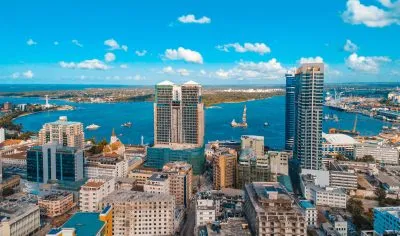Green bonds are fast becoming the rage across the continent. Tom Minney reports on recent developments in Kenya, Nigeria and South Africa
Kenya’s President Uhuru Kenyatta opened trading on the London Stock Exchange on 20 January to celebrate the first week of a dual-listed KES4.3bn ($42.7m) green bond medium-term note (MTN) programme on the LSEG international Securities Market.
The bond is issued by Acorn Holdings, a property developer, and will be used to finance building green-certified, clean, safe, and affordable accommodation for 5,000 students in Nairobi.
The bond, certified by the Climate Bonds Initiative, was first issued in Nairobi in October 2019 in a deal structured by Stanbic Bank Kenya and Guarantco, part of the Private Infrastructure Development Group international consortium.
Kenya’s green bonds programme is backed by FSD Africa, Dutch development bank FMO, the Kenya Bankers Association, the Nairobi Securities Exchange and the Climate Bonds Initiative.
The notes are structured as a project bond and the programme is the first to achieve green certification in Kenya, ensuring it contributes to cutting carbon emissions. Rating agency Moody’s awarded a B1 rating to Acorn’s MTN programme, above Kenya’s sovereign rating of B2.
As global institutional investors switch decisively away from oil and gas and seek green investments, the green bonds revolution is sweeping across African stock exchanges and creating new opportunities for investment banks and project developers.
The African Development Bank has been issuing green bonds since 2013 and by June 2019 it had allocated $3.7bn to 48 projects across at least 18 African countries, including solar and hydropower, energy efficiency, clean transport, biogas, forestry conservation, water and wastewater management.
Nigeria goes green
In February, Nigeria’s Access Bank was reported to seek an international listing on the Luxembourg Stock Exchange for its N15bn ($41.1m) green bond, although the bonds will not be traded there.
The bond was fully subscribed on the Nigerian Stock Exchange when it was listed in March 2019 after a book-build capital raising. It is a five-year bond paying a coupon rate of 15.50%. It has been certified by the Climate Bonds Initiative for meeting the required standards for a climate bond. Access Bank will use the funding for loans including projects for flood defence, solar generation and agriculture.
In October 2019 in Singapore, the Nigerian Stock Exchange and the Luxembourg Stock Exchange, the largest listing global platform for green bonds, signed a Memorandum of Understanding covering promoting cross-listing and trading of green bonds in Nigeria and Luxembourg.
Nigeria’s Green Bond Market Development Programme also draws in the FMDQ OTC Exchange and the Securities and Exchange Commission of Nigeria and was launched in June 2018.
Another Nigerian green bond, issued by North South Power Company Limited (NSP) in February 2019, is a N8.5bn ($23.3m) 15-year corporate infrastructure green bond paying a coupon of 15.60%.
It scored commitments from 12 institutional investors, including nine pension funds, and was oversubscribed by 60%. NSP has a 30-year concession on Shiroro hydroelectric power plant and the bond is part of a $137m financing programme.
The NSP bond has a credit rating of AAA because it is guaranteed by Infracredit, a credit enhancement structure backed by the Nigerian Sovereign Investment Authority, Guarantco, Germany’s KfW Bank and Africa Finance Corporation.
Nedbank’s Renewable Energy Bond wins African Banker award
In April 2019, Nedbank issued R1.7bn ($100m) of renewable energy bonds after attracting bids totalling R5.4bn ($319m) for an issuance originally targeted at R1.5bn ($98m). This was the first Certified Climate Bond to be issued in South Africa. The bank is using the proceeds to finance three solar energy projects and one wind energy project.
In August 2020 the success of the issuance was recognised when the bank won the African Banker Energy Project of the Year Award for the bond. The award is made for the project which has had the most significant impact. The deal may provide a template for such future transactions and will have highlighted new possibilities and new solutions within the sector/industry it relates to.
Bruce Stewart, Head of Debt Capital Market Origination at Nedbank CIB, commented at the time of the issuance that the strong response was indicative of the growing appetite within global investment circles for opportunities to achieve a reliable return on investment while doing good for the planet and its people.
He explained that Nedbank had aligned its commercial activities with the SDGs, the result of which had been the commitment of a significant portion of the bank’s lending book towards sustainable activities, particularly in the renewable energy space.
“As a bank with a stated purpose to use our financial expertise to do good for individuals, families, businesses and society, Nedbank has committed itself to contributing meaningfully to the achievement of the SDGs,” he said.
In July 2020 Nedbank issued a R2bn SDG-linked Tier 2 capital instrument, the first of its kind in South Africa. The issuance came a little over a month after Nedbank’s shareholders voted to commit the bank to adopting and publicly disclosing an energy policy and reporting fully on its approach to measuring, disclosing and assessing its exposure to climate-related risks.
Black rhino bond
Conservationists are marketing a $50m black rhino bond. Investors will get back their capital and gain a coupon payment if the number of black rhinos increases across five sites in Kenya and South Africa.
The numbers have gone down from some 65,000 in the 1970s to about 5,500 presently, with a severe threat of extinction in the wild due to poaching.
The bond is arranged by Conservation Capital. It is a five-year outcomes-based bond, similar to impact bonds previously used for health and education outcomes. It aims to boost the figures by over 500 rhinos and is backed by UBS and Credit Suisse as well as the London Zoological Society.
Want to continue reading? Subscribe today.
You've read all your free articles for this month! Subscribe now to enjoy full access to our content.
Digital Monthly
£8.00 / month
Receive full unlimited access to our articles, opinions, podcasts and more.
Digital Yearly
£70.00 / year
Our best value offer - save £26 and gain access to all of our digital content for an entire year!
 Sign in with Google
Sign in with Google 


